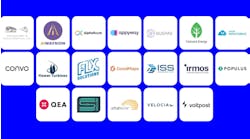Cal-ITP unveils new open data standard to improve transit agency operations
The California Department of Transportation's (Caltrans) California Integrated Travel Project (Cal-ITP) launched a new open data standard to capture and integrate more information impacting transit agency operations.
The Operational Data Standard (ODS) leverages the existing GTFS (General Transit Feed Specification) standard used by transit agencies and riders all over the world for transit service information and extends it to include data about personnel, scheduled maintenance and non-revenue service.
The ODS specification is a product of the ODS Working Group, a coalition of more than 40 transit agencies, transit technology vendors such as computer-aided dispatch/automatic vehicle location (CAD/AVL) companies, transit scheduling companies and other contributors.
“Cal-ITP is all about reducing barriers to transit, including digital ones,” said Gillian Gillett, program manager of California Integrated Mobility at Caltrans. “During these times of accelerating change and innovation within the industry, ODS can help promote an interoperable transit ecosystem by improving the flow of data and information sharing.”
Cal-ITP began approaching transit agencies in 2020 to identify ways to improve transit data quality and completeness to offer more information and improved trip planning for California riders—for example, helping passengers with mobility-assisting devices find stations where they can easily board and alight vehicles. Many transit agencies expressed frustration that the different software platforms they use for scheduling, dispatching and planning didn’t communicate well together, resulting in inefficiency, increased costs and data errors.
Cal-ITP convened the ODS Working Group to develop an open data solution to the issues raised by transit agencies and to integrate the information from the various platforms to provide a more complete picture of transit operations. Open standards, particularly GTFS and GTFS Realtime, are popular with North American transit agencies and riders alike to plan trips with mobile apps and maps and to account for changing conditions and delays in real time.
"As the largest private-sector provider of mobility solutions in North America, First Transit supports open standards for sharing transit service operations data," said Sean Donavan, vice president of information technology and innovation at First Transit, a member of the ODS Working Group. "Enhanced data sharing will help us continue to deliver the best passenger experience."
Jeff Kessler, director of service delivery innovation at Keolis Commuter Services, added, “As a mobility provider, Keolis interfaces with our partner agencies and countless software providers to safely and efficiently operate our transportation systems. Building upon the successful GTFS standard, we’re thrilled to have contributed to advancing the standard’s development and to enable further innovations in the mobility space.”
Supporting open standards such as ODS also aligns with Cal-ITP’s work on the Mobility Data Interoperability Principles, an effort that seeks to achieve frictionless access to transit data between software applications.
While ODS will transmit data within the transit agency (and its vendors) for operations, it builds upon the public-facing GTFS open standard, reducing the frustration agencies often encounter when integrating new technologies.
“We have created dozens of custom AVL interfaces over the years,” said David Reed, president and founder of Schedule Masters, Inc. “With ODS, we can now look forward to a standard interface from our runcutting and rostering software.”
With the public launch of ODS, Cal-ITP and the ODS Working Group welcome feedback to help steer the implementation of this new open standard. The coalition will also be seeking partner agencies whose service data can be used for initial applications of the ODS specification.



